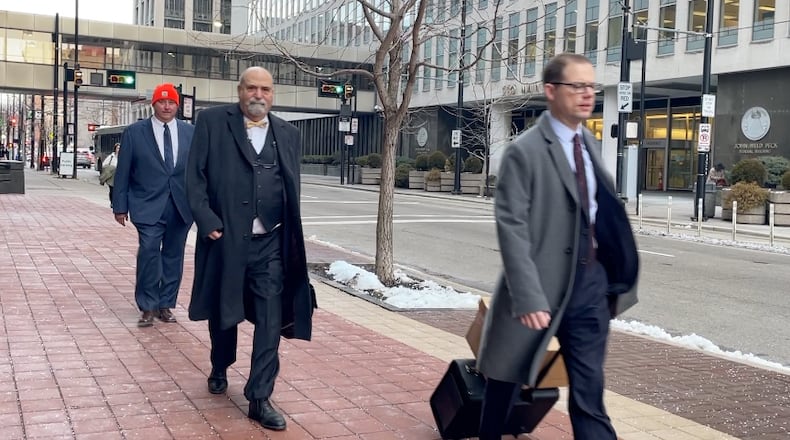The maneuver might shed light on problems with the regulator, the Public Utilities Commission of Ohio, and that Capitol Square has with corruption more generally.
Robert Glickman, a defense attorney for former House Speaker Larry Householder, on Friday conducted a second day of cross examination of FBI Special Agent Blane Wetzel, the lead agent in the case. As he did, Glickman sought to demonstrate that evidence intended to show Householder acted corruptly actually indicates the opposite — that what the speaker did was business as usual.
Householder is accused of masterminding a scheme to use $61 million — primarily from Akron-based FirstEnergy — to make himself House speaker in January 2019. In return, prosecutors allege, Householder ramrodded a $1.3 billion measure through the legislature that primarily benefited FirstEnergy’s failing nuclear and coal plants.
Gov. Mike DeWine signed the bill the same day it passed the legislature in July 2019. A year later, as they announced charges against Householder and four others, federal prosecutors said it was likely the biggest bribery and money laundering scandal in Ohio history.
Two of Householder’s co-defendants have pleaded guilty and a third died by suicide. FirstEnergy admitted to misdeeds in a deferred prosecution agreement. Householder and Matthew Borges, a lobbyist and former chairman of the Ohio Republican Party, are fighting the charges.
During the case, actions by the Public Utilities Commission of Ohio have come up.
In early 2019, DeWine appointed as PUCO chairman a former FirstEnergy consultant who was paid $4.3 million by the utility just before taking his seat on the commission. Even though he was supposed to be regulating the utility, the official, Sam Randazzo, played a role in writing the bailout legislation, according to documents released by the Ohio House.
The FBI in 2020 raided Randazzo’s Columbus condominium, but he hasn’t been charged.
In January 2019, DeWine became governor, Householder was elected speaker and the effort to pass the utility bailout through the legislature got underway. At the same time, PUCO Senior Policy Advisor Pat Tully apparently went job hunting — also with entities his agency was supposed to be regulating.
According to emails twice referenced in the trial. On Jan. 25, 2019, FirstEnergy lobbyist Ty Pine forwarded Tully’s resume to Jeffrey Longstreth, Householder’s political strategist who has pleaded guilty and is expected to testify in the case.
A month later, in February 2019, Tully was made senior advisor on energy issues by the House Republican Caucus, according to testimony in the case and Tully’s LinkedIn profile. Tully stayed in that role until last May — and through the time that the corrupt bailout, House Bill 6, was written, passed, a repeal effort was defeated, arrests were made and guilty pleas entered.
A phone message was left at a number associated in public records databases with Tully’s name, but it wasn’t immediately answered on Friday.
In his role as energy advisor to House Republicans, Tully did an economic analysis of HB 6. He also communicated with PUCO Chairman Randazzo on the language of the bill, the Energy and Policy Institute reported.
In testimony on Friday, Householder attorney Glickman seemed to be trying to show that Tully was qualified for the job in the GOP Caucus that Householder hired him for.
Citing Tully’s role at the PUCO, Glickman asked of Wetzel, “He was certainly qualified to do energy policy, wasn’t he?” Glickman asked. Wetzel, the FBI agent, replied that that was what Tully’s resume said.
The two didn’t discuss the propriety of regulators circulating resumes with companies they’re supposed to be regulating.
Testimony is expected to continue on Monday. The trial is expected to last into March.
About the Author
